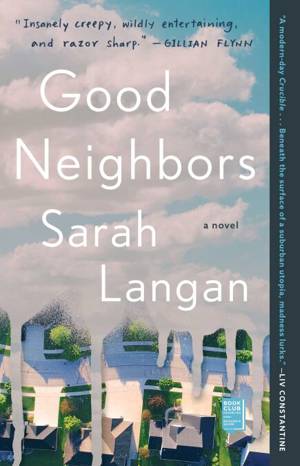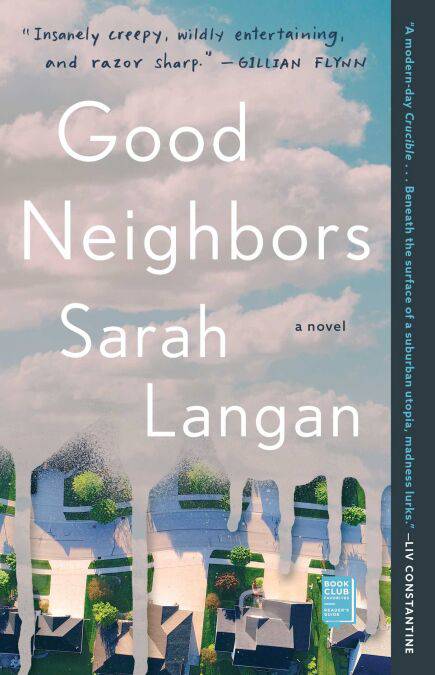
- Afhalen na 1 uur in een winkel met voorraad
- Gratis thuislevering in België vanaf € 30
- Ruim aanbod met 7 miljoen producten
- Afhalen na 1 uur in een winkel met voorraad
- Gratis thuislevering in België vanaf € 30
- Ruim aanbod met 7 miljoen producten
Zoeken
Omschrijving
Celeste Ng and Liane Moriarty’s enthralling dissection of suburbia meets Shirley Jackson’s creeping dread in this “wickedly funny, unnerving puzzle box of a novel” (Dan Chaon, author of Ill Will) about the downward spiral of a Long Island community after a tragedy exposes its residents’ depths of deception.
Welcome to Maple Street, a picture-perfect slice of suburban Long Island, its residents bound by their children, their work, and their illusion of safety in a rapidly changing world.
But menace skulks among this exclusive enclave. When the Wilde family arrive, they trigger their neighbors’ worst fears. Dad Arlo’s a gruff has-been rock star with track marks. Mom Gertie’s got a thick Brooklyn accent, with high heels and tube tops to match. Their weird kids cuss like sailors. They don’t fit with the way Maple Street sees itself.
Maple Street’s Queen Bee, Rhea Schroeder—a lonely professor repressing a dark past—initially welcomed Gertie, but relations plummeted during one summer evening, when the new best friends shared too much, too soon. By the time the story opens, the Wildes are outcasts.
As tensions mount, a sinkhole opens in a nearby park, and Rhea’s daughter Shelly falls inside. The search for Shelly brings a shocking accusation against the Wildes. Suddenly, it is one mom’s word against the other’s in a court of public opinion that can end only in blood.
Riveting and ruthless, Good Neighbors is “a chilling, compulsively readable novel that looks toward the future in order to help us understand how we live now” (Kevin Wilson, author of Nothing to See Here).
Welcome to Maple Street, a picture-perfect slice of suburban Long Island, its residents bound by their children, their work, and their illusion of safety in a rapidly changing world.
But menace skulks among this exclusive enclave. When the Wilde family arrive, they trigger their neighbors’ worst fears. Dad Arlo’s a gruff has-been rock star with track marks. Mom Gertie’s got a thick Brooklyn accent, with high heels and tube tops to match. Their weird kids cuss like sailors. They don’t fit with the way Maple Street sees itself.
Maple Street’s Queen Bee, Rhea Schroeder—a lonely professor repressing a dark past—initially welcomed Gertie, but relations plummeted during one summer evening, when the new best friends shared too much, too soon. By the time the story opens, the Wildes are outcasts.
As tensions mount, a sinkhole opens in a nearby park, and Rhea’s daughter Shelly falls inside. The search for Shelly brings a shocking accusation against the Wildes. Suddenly, it is one mom’s word against the other’s in a court of public opinion that can end only in blood.
Riveting and ruthless, Good Neighbors is “a chilling, compulsively readable novel that looks toward the future in order to help us understand how we live now” (Kevin Wilson, author of Nothing to See Here).
Specificaties
Betrokkenen
- Auteur(s):
- Uitgeverij:
Inhoud
- Aantal bladzijden:
- 304
- Taal:
- Engels
Eigenschappen
- Productcode (EAN):
- 9781982144388
- Verschijningsdatum:
- 1/02/2021
- Uitvoering:
- E-book
- Beveiligd met:
- Adobe DRM
- Formaat:
- ePub

Alleen bij Standaard Boekhandel
+ 14 punten op je klantenkaart van Standaard Boekhandel
Beoordelingen
We publiceren alleen reviews die voldoen aan de voorwaarden voor reviews. Bekijk onze voorwaarden voor reviews.








